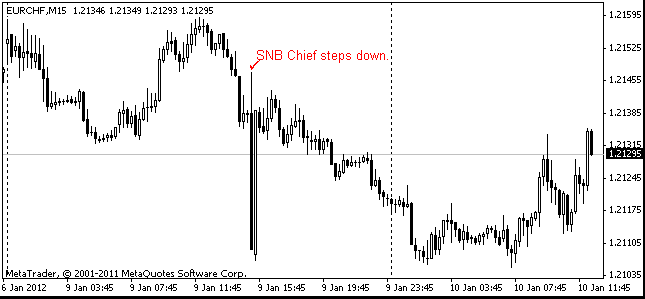EUR/usd
In its global economic forecasts the International Monetary Fund tries to intimidate the world and the European leaders in particular. The IMF expects the GDP growth to make 3.3% in 2012, but if the Old World wallows in new grave problems, the GDP is forecasted to be only 1.3%. In fact, such slackening is likely to be caused by the crisis spreading far beyond the euro area and hampering the growth of the emerging countries. Specifically to the eurozone IMF's chief economist Blanchard promised a 0.5% decline at year-end. Of course, that warning should be viewed in the context of the IMF's determination to play a big role in the world, building its lending power up to $1 trln dollars. But so far such proposals have got an icy welcome from other countries, which is quite normal at the time when almost all governments are hotly disputing over their own budgets. Meanwhile, the euro still feels good. The correction which started yesterday has ceased on a positive profit report from Apple, which triggered the demand for risky assets. That day-end rise ensured the return of the euro in the area above 1.30, but the further growth requires stronger factors. Perhaps, Fed's press conference, to be held tonight, will be one of them. At this meeting the fomc is for the first time expected to publish the charts with its interest rate forecasts. This is a new step to transparency by the most powerful central bank, which is sure to be welcomed by markets. However, we should bear in mind that in January the policymakers' speeches have been by far more cautious than the market sentiments and that over the last few years the market has been mistaken in its optimism more often than the Fed in its prudence.

GBP/USD
BOE's head King asserted in his speech that the inflation slowdown gives the central bank more space for maneuvering and thus allows for the further QE increase if necessary. To be honest, high inflation has never been the factor to stop the central bank. In 2009 the politicians talked about the slowing down inflation rate as a mere excuse for expanding QE. This day may become the key one for the sterling. The preliminary statistics for 4Q will be released. Analysts are expecting a 0.1% decline. Besides, there will be published the MPC meeting minutes, from which we will be able to make out how close the committee is to expanding the asset purchase programme. Though at t the beginning of 2011 the economic downturn didn't lead to the QE expansion, this time it may be different. The pound continued to rise yesterday in Forex – it reached 1.56, but didn't manage to go up far from it in the run-up to a very eventful day.

USD/JPY
The Japanese yen has fallen against most of its Forex rivals yesterday. After the release of poor data on the international trade this morning the yen continued to decline. USD/JPY is now close to 77.90, against 76.90 a day ago. This rapid growth after a long period without any significant movements signals the return of players to the markets. Traders have begun to assess the prospects of the country, which has to recover from the earthquake. Now many market participants focus on the positive aspects of this event. But they forget that the country's recovery will require import growth, while destroyed factories and poor external demand will be a deterrent to exports. In brief the country's recovery is a positive factor for the economy, which is able to show the GDP growth of 2%-2.2% (almost fantastic for Japan), but in this case the country's position as an exporter may suffer, which will cause an increase in the security yields of the country and thus will weaken the yen.

USD/CHF
Together with the yen the Swiss franc is also heading downwards. It looks as though the capital flows, inspired by a favourable situation in stock markets, had moved away from the safe dollar, yen and franc. This will be certainly welcomed by politicians of these countries. Following the euro purchases, the euro/franc has moved upwards from the low of 1.2060. However, over the last two days the franc and the dollar declines have balanced each other, so the dollar/franc has been in choppy trade for the second day.
